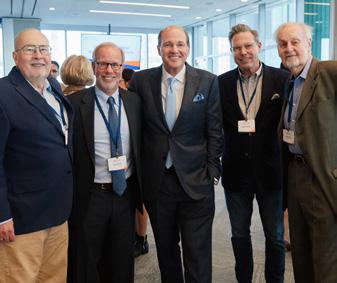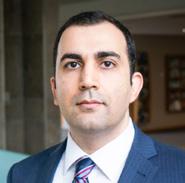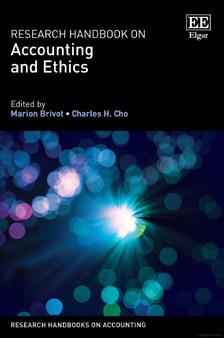Book Chapters
Schulich’s faculty members are among the most innovative scholars in the world, conducting breakthrough research in numerous fields of business. Below is a selection of book chapters representing top-calibre research in various disciplines.
Aulakh, Preet S. (2024). “Trust in International Marketing Relationships: A Retrospective.”
In Saeed Samiee, Constantine S. Katsikeas and Petra Riefler (Eds.), Key Developments in International Marketing — Influential Contributions and Future Avenues for Research, JIBS Special Collection, 177-188. Switzerland: Palgrave Macmillan. (with M. Kotabe and A. Sahay)
Auster, Ellen (2023). “Values, Authenticity and Responsible Leadership.” In Sergiy Dmytriyev and R. Edward Freeman (Eds.), R. Edward Freeman’s Selected Works on Stakeholder Theory and Business Ethics, (1st Ed) Eminent Voices in Business Ethics Series, 539-552. Switzerland: Springer Nature. (with R. E. Freeman)
Auster, Ellen (2023). “Values and Poetic Organizations: Beyond Value Fit Toward Values Through Conversation.” In Sergiy Dmytriyev and R. Edward Freeman (Eds.), R. Edward Freeman’s Selected Works on Stakeholder Theory and Business Ethics, (1st Ed) Eminent Voices in Business Ethics Series, 553-569. Switzerland: Springer Nature. (with R. E. Freeman)
Belk, Russell (2024). “Digital Possessions.” In Julia Gisler and Johanna Gollnhoffer (Eds.), The Edward Elgar Encyclopedia of Consumer Behavior, 151-153. Cheltenham: Edward Elgar.
Belk, Russell (2024). “Extended Self.” In Julia Gisler and Johanna Gollnhoffer (Eds.), The Edward Elgar Encyclopedia of Consumer Behavior, 162-164. Cheltenham: Edward Elgar.
Belk, Russell (2024). “Introduction.” In Russell Belk and Cele Otnes (Eds.), Handbook of Qualitative Research Methods in Marketing (2nd Ed). Cheltenham: Edward Elgar. (with C. Otnes)
Belk, Russell (2024). “Sharing.” In Julia Gisler and Johanna Gollnhoffer (Eds.), The Edward Elgar Encyclopedia of Consumer Behavior, 277-279. Cheltenham: Edward Elgar.
Belk, Russell (2024). “Smartphone Society: the Role of Consumer Video in an Age of Ubiquitous Platforms and Devices.” In Russell Belk and Cele Otnes (Eds.), Handbook of Qualitative Research Methods in Marketing (2nd Ed), 410-421. Cheltenham: Edward Elgar. (with R. Kozinets)
Belk, Russell (2024). “Videographic and Visual Consumer Research: The State of the Art.” In Fatema Kawaf (Ed.), Visual Methods in Marketing and Consumer Research, 35-55. London: Routledge. (with R. Kozinets)
Belk, Russell (2023). “No Cash, No Coins, No Cards, But You: Biohacking the Future of Payments.” In Kristina Bäckström, Carys Egan-Wyer, and Emma Samisoe (Eds.), The Future of Consumption, 251-262. Switzerland: Palgrave Macmillan. (with V. Lima)
Belk, Russell (2023). “Fashion Police to Fast Fashion: “Slow Down and Pull Over.” In Karin Ekström (Ed.), Marketing Fashion: A Cultural Approach, 25-40. London: Routledge.
Belk, Russell (2023). “Living in a Digital Age.” In Russell Belk and Rosa Llamas (Eds.), Routledge Handbook of Digital Consumption, 3-21. London: Routledge. (with R. Llamas)
Belk, Russell (2023). “Chatbots.” In Rosa Llamas and Russell Belk (Eds.), Routledge Handbook of Digital Consumption, 3-21. London: Routledge.
Belk, Russell (2023). “Foreword and Reverse.” In Marco Pichierri (Ed.), Nostalgia Marketing: Rekindling the Past to Influence Consumer Choices, v-ix. Switzerland: Palgrave-Macmillan.
Belk, Russell (Forthcoming). “Art and Art Collecting in a Digital Age.” In Adelina Broadbridge, Borum Lee, and Ian Fillis (Eds.), Routledge Companion to Arts Marketing, London: Routledge.
Belk, Russell (Forthcoming). “Brand Hive Minds and Bitcoin Resilience.” In Carolyn Strong (Ed.), Cryptocurrency and Blockchain: Consumer Research and Business Insights Berlin: De Gruyter. (with M. Humayun)
Belk, Russell (Forthcoming). “Creating Brand Hive Minds Through Bitcoin and the Blockchain.” In Carolyn Strong (Ed.), Advances in Blockchain Research and Consumer Behaviour. (with M. Humayun)
Belk, Russell (Forthcoming). “Extended Self in a Digital Age.” In Ayalla Ruvio and Russell Belk (Eds.), Routledge Handbook of Identity and Consumption. London: Routledge.
Belk, Russell (Forthcoming). “Foreword.” In Carolyn Strong (Ed.), Cryptocurrency and Blockchain: Consumer Research and Business Insights. Berlin: De Gruyter.
Belk, Russell (Forthcoming). “The Modern Girl Myth: Understanding the New Indian Woman Through her Consumption Choices.” In Ayalla Ruvio and Russell Belk (Eds.), Routledge Handbook of Identity and Consumption London: Routledge. (with T. Ghoshal)
Biehl, Markus (2023). “A Triadic Perspective on the Risks and Benefits of IS Outsourcing in a Software as a Service (SaaS) Environment.” In Kurt Engemann, Cathryn F. Lavery, Jeanne M. Sheehan (Eds.), Socio-Political Risk Management: Assessing and Managing Global Insecurity, Chapter 9, 161-180. Munich: DeGruyter. (with N. Kulangara)
Cho, Charles H. (2023). “Combating Crises: How Social and Environmental Accounting Can Build a Future-Proof Economy.” In Adrian Zicari and Tom Gamble (Eds.), Responsible Finance and Accounting: Performance and Profit for Better Business, Society and Planet, 65-70. London: Routledge.
Cho, Charles H. (2023). “Financial and Non-Financial Disclosure: As a Future Shareholder, Would You Pay? If So, How Much More or Less?” In Adrian Zicari and Tom Gamble (Eds.), Responsible Finance and Accounting: Performance and Profit for Better Business, Society and Planet, 30-34. London: Routledge.
Cho, Charles H. (2023). “Introduction to Research Handbook on Accounting and Ethics.” In Marion Brivot and Charles H. Cho (Eds.), Research Handbook on Accounting and Ethics, xxi-xxvii. Cheltenham: Edward Elgar. (with M. Brivot)
Eberlein, Burkard (2023). “Energie- und Klimapolitik in Deutschland und Kanada: Auf Dem Steinigen Weg ins Post-Fossile Zeitalter (Energy and Climate Policy on the Path to the Post Fossil-Fuel Age).”
In B. Moshovits, R. Ohlinger, and T. Triadafilopoulos (Eds.), Vorbild Kanada, Modell Deutschland: Perspektiven des Transfers (Example Canada, Model Germany: Perspectives for Transfer). Frankfurt/ New York: Campus. (with F. Holz, C. Kemfert, and P.-Y. Oei)
Farjoun, Moshe (2024). “Interlocking Surprises, Their Nature, Implications, and Potential Responses.” In Jean-Christophe Le Coze, Benoît Journé (Eds.), Compliance and Initiative in the Production of Safety: A Systems Perspective on Managing Tensions and Building Complementarity, 61-71. Switzerland: Springer Nature.
Fischer, Eileen (2023). “What Are Audiences And Why Do They Matter?.” In E. Arnould, D. Crockett, C. Thompson and M. Weinberger (Eds.), Consumer Culture Theory 2nd Edition, 16, 327-343. California: Sage. (with M. Parmentier, C. A. Russell, and H. Schau)
Fischer, Eileen (2023). “Market System Dynamics: Key Processes, Biases and Research Opportunities.” In S. Geiger and S. Schwarzkopf (Eds.), Handbook of Market Studies. Cambridge: Cambridge University Press. (with M. Giesler)
Fischer, Eileen (Forthcoming). “Building Marketing Theory Using Archival Data: Understanding Alternative Approaches. In R. Belk and C. Otnes (Eds.), Handbook of Qualitative Research, 309-319. Cheltenham: Edward Elgar. (with M.A. Parmentier)
Fischer, Eileen (Forthcoming). “Reflections on Template Creep and Replicability Concerns in Contemporary Qualitative Research.” In R. Belk and C. Otnes (Eds.), Handbook of Qualitative Research. Cheltenham: Edward Elgar. (with P.Y. Dolbec)
Graham, Cameron (2024). “Economic Rents at the End of Life: For-Profit Eldercare and the Myth of Corporate Accountability.” In Hendrik Vollmer (Ed.), Handbook of Accounting in Society, 415-428. United Kingdom: Edward Elgar. (with D. Himick, and P.-L. Nappert)
Graham, Cameron (2024). “Preparing the Future: The Roles of Accounting in Public and Private Pensions.” In Hendrik Vollmer (Ed.), Handbook of Accounting in Society, 141-154. United Kingdom: Edward Elgar.
Kamstra, Mark (2023). “Seasonality in Stock Returns and Government Bond Returns.”
In Gilles Hilary and David McLean (Eds.), Handbook of Financial Decision Making Research Handbooks in Money and Finance Series, 36-62. Massachusetts: Edward Elgar. (with L. A. Kramer)
Kipping, Matthias (2023). “Management Consultants: From Pariah to Hegemon?” In Faïz Gallouj, Camal Gallouj, Marie-Christine Monnoyer, Luis Rubalcaba, and Markus Scheuer (Eds.), Elgar Encyclopedia of Service Studies Cheltenham: Edward Elgar.
Kipping, Matthias (Forthcoming), “Beyond Expectations: Consultants as the ModernDay Oracle.” In Ingo Köhler, Laetitia Lenel, Alexander Nützenadel, and Jochen Streb (Eds.), The Routledge Handbook of Economic Expectations in Historical Perspective, London: Routledge. (with Sebastian Schöttler)
Lyons, Brent (2024). “Overcoming Biases Across the Human Resource Management Lifecycle for Individuals with a Criminal Record.” In N.C.J. Young & J.N. Griffith (Eds.), Employing our Returning Citizens: An Employer-Centric, 123-158. United Kingdom: Palgrave MacMillan. (with S. D. Volpone, F. G. Macoukji, and R. Ragaglia)
Lyons, Brent (2023). “Disability as an Enabler of Career Success and Inclusion.” In Sally Robinson and Karen Fisher (Eds.), Research Handbook on Disability Policy, 756-771. United Kingdom: Edward Elgar. (with D. Samosh, M. Kulkarni, and A. Santuzzi)
Lyons, Brent (2023). “Neuroqueerness and Management Research.” In Joy Beatty, Sophie Hennekam, and Mukta Kulkarni (Eds.), De Gruyter Handbook of Disability and Management, 287-304. Germany: De Gruyter. (with C. Bryan and S. D. Volpone)
Madhok, Anoop (2023). “Platform Scope and Value Creation in Digital Platforms.” In Carmelo Cennamo, Giovanni Dagnino, and Feng Zhu (Eds.), Research Handbook on Digital Strategy, 143-158. United Kingdom: Edward Elgar. (with R. K. Murthy)
Matten, Dirk (2023). “Corporate Social Responsibility in Business Groups.” In Deborah Poff and Alex Michalos (Eds.), Encyclopedia of Business and Professional Ethics, 454-457. Berlin: Springer International. (with M. Ararat and A. M. Colpan)
Phillips, Robert (2023). “The Past as Corporate Social Responsibility.” In Stephanie Decker, William M. Foster, and Elena Giovannoni (Eds.), Handbook of Historical Methods for Management, 359-369. Cheltenham: Edward Elgar. (with J. Schrempf-Stirling and C. Stutz)
Phillips, Robert (2023). “Managerial Discretion: A Review and Future Directions.” In Till Talaulicar (Ed.), Research Handbook on Corporate Governance and Ethics, 244-262. Cheltenham: Edward Elgar. (with R. Kurdyukov, S. L. Berman, M. E. Johnson-Cramer, and H. Elms)
Prisman, Eliezer (Forthcoming). “Real Estate Transactions in Ancient Israel: Excavating Embedded Options Utilizing Modern Finance & Comparing it to Ontario Property & Contract Law.” In G. Epstein and E. Katz (Eds.), Jewish Law, Lore, and Economics: Essays in memory of Jacob Rosenberg (Provisional title). Israel: Bar-Ilan University Press. (with M. Huberman)
Saxton, Gregory (2023). “The Impact of Regulation and Monitoring on Nonprofit Organizations.” In Linda Parsons and Daniel Tinkelman (Eds.), Research Handbook in Nonprofit Accounting, 214-230. Cheltenham: Edward Elgar. (with D. Neely and G. Maharaj)
Shen, Winny (2024). “Culture and Work-Family Dynamics.” In M. Gelfand and M. Erez (Eds.), Oxford Handbook on Culture and Organizations, 537-560. Oxford: Oxford University Press. (with K. S. Shockley)
Shen, Winny (2023). “Betwixt and Between: My Journey to Date in Examining Issues of Race and Ethnicity.” In E.B. King, Q. Roberson & M. Hebl (Eds.), Research on Social Issues in Management: Perspectives on Race and Work, 147-157. North Carolina: Information Age Publishing.
Tasa, Kevin (2023). “Conflict Resolution Through Negotiation and Mediation.” In Craig Pearce and Edwin A. Locke, E.A. (Eds.), Handbook of Principles of Organizational Behavior: Indispensable Knowledge for Evidence-Based Management (3rd edition), 483-502. New York: Blackwell Wiley. (with E. Chadha)
Thorne, Linda (2023). “The Professional Responsibility of Accountants as Re-Defined by the Inclusion of the NOCLAR Standard in the Code of Ethics.” In Marion Brivot and Charles H. Cho (Eds.), Research Handbook on Accounting and Ethics, 19-34. Northampton, MA: Edward Elgar. (with K. Fiolleau and P. Nappert)
Thorne, Linda (2023). “Reference Points, Mental Accounting, and Taxpayer Compliance: Insights from a Field Study.” In Khondkar E. Karim (Ed.), Advances in Accounting Behavioral Research, 139-167. Bingley: Emerald. (with I. Burke and J. Walker)
Veresiu, Ela (2023). “Global Mobilities.” In Eric J. Arnould, David Crockett, Craig J. Thompson, and Michelle Weinberger (Eds.), Consumer Culture Theory (2nd Edition), 249-272. California: Sage Publishing. (with F. Bardhi, M. Luedicke, and Z. Sharifonnasabi)
Veresiu, Ela (2023). “Market Mythmaking and Consumer Culture.” In Eric J. Arnould, David Crockett, Craig J. Thompson, and Michelle Weinberger (Eds.), Consumer Culture Theory (2nd Ed), 273. California: Sage Publishing. (with E. J. Arnould and C. J. Thompson)
Veresiu, Ela (2023). “Consumer Culture.”
In Cait Lamberton, Derek Rucker, and Stephen Spiller (Eds.), The Cambridge Handbook of Consumer Psychology (2nd Edition), 500-528. Cambridge: Cambridge University Press.
Weber, Olaf (2023), “Assessing the Current State of Research on Climate and Environment Related Financial Risks, What Are We Missing? A Review and Research Agenda.” In Othmar M. Lehner, Theresia Harrer, Hanna Silvola, and Olaf Weber (Eds.), The Routledge Handbook of Green Finance, 446. London: Routledge. (with R. Care)
Weber, Olaf (2023). “AI for Sustainable Finance: Governance Mechanisms for Institutional and Societal Approaches.” In F. Mazzi & L. Floridi (Eds.), The Ethics of Artificial Intelligence for the Sustainable Development Goals, 203-229. Cham: Springer International Publishing. (with S. Pashang)
Wesson, Tom (2023). “Social Media Evidence in Commercial Litigation.” In Jacob Gersen and Joel Steckel (Eds.), The Cambridge Handbook of Marketing and The Law, 312-344. Cambridge: Cambridge University Press. (with M. Pelofsky, E. Schaeffer, B. Wesson, D. Heller, and B. Glaviano)
Journal Articles
One of the features that makes a school of business perform at a consistently high level is the quality of its researchers. Scholars at Schulich have transformed the way management educators understand core issues in many areas and are publishing in prestigious journals.
Aulakh, Preet. S. (In press), “Exploratory Search and International Performance: When Do Local Alliances Matter?,” Journal of International Marketing, 0(0). (with M. Abdi, and Z. Ma.) https://doi.org/10.1177/ 1069031X231216409
Bae, Kee Hong (2024), “Restricting CEO Pay Backfires: Evidence from China,” Journal of Business Finance & Accounting, 51, 1015–1045. (with Z. Gong and W. Tong) https://doi.org/10.1111/jbfa.12741
Bae, Kee Hong (2023), “Proprietary Information and the Choice Between Public and Private Debt,” Accounting and Finance, 64, 1693–1721. (with W. Tan, D. Yunhao, and W. Wang) https://doi.org/10.1111/acfi.13197
* Bae, Kee Hong (2023), “In the CEO We Trust: Negative Effects of Trust Between the Board and the CEO,” Journal of Financial and Quantitative Analysis, 1-34. (with S. El Ghoul, Z. Gong, and O. Guedhami) https://dx.doi.org/10.2139/ssrn.4388605
Bae, Kee Hong (Forthcoming), “The Effect of Board Reforms on CEO Compensation: Evidence from a Comparison between Public and Private Firms,” Review of Corporate Finance. (with J. Kang and A. Tsang)
Bamber, Matthew (2024), “Across the Faultlines: A Multi-Dimensional Index to Measure and Assess Board Diversity,” International Review of Financial Analysis, 93, 103231. (with T. Elshan and H. Omara) https://doi.org/10.1016/j.irfa.2024.103231
Bamber, Matthew (2024), “Denunciation and Resistance in Post-Crisis Sensemaking,” Critical Perspectives on Accounting, 99, 102720. (with J. Kurpierz and A. Popa) https://doi.org/10.1016/j.cpa.2024.102720
Bamber, Matthew (2024), “Introduction to the Special Issue of Qualitative Research in Accounting,” Accounting Perspectives, 23(2), 139-146. (with P. Lassou) https://doi.org/10.1111/1911-3838.12368
Bamber, Matthew (2023), “Out of control? Tracking System Technologies and Performance Measurement,” Management Accounting Research , 61, 100855. (with P. Nappert) https://doi.org/10.1016/j.mar.2023.100855
Bamber, Matthew (2023), “Conceptualising ‘Within-Group Stigmatisation’ Among High-Status Workers,” Work, Employment and Society, 37(3), 757-775. (with J. McCormack and B. J. Lyons) https://doi.org/10.1177/ 09500170211041287
Bamber, Matthew (2023), “Balancing Emic-Etic Tensions in the Field-, Head-, and Text-Work of Ethnographic Management Accounting Research,” Journal of Management Accounting Research, 35(1), 23-47. (with M. Tekathen) https://doi.org/10.2308/ JMAR-2019-504
* Bamber, Matthew (2023), “The Next Mission: Inequality and Service-to-Civilian Career Transition Outcomes Among 50+ Military Leavers,” Human Resource Management Journal, 33(2), 452-469. (with W. Wang, M. Flynn, and J. McCormack) https://doi.org/10.1111/1748-8583.12459
Bamber, Matthew (2023), “Beyond the Pages of the ‘How-To’ Textbook: A Study of the Lived Experiences of the Accounting Ethnographer,” Critical Perspectives on Accounting, 93, 102415. (with M. Tekathen) https://doi.org/10.1016/j.cpa.2021.102415
Bamber, Matthew (In press), “Breaking the Inequality Reproduction Circle in the NHS: The Importance of Senior Management Team’s Actions (SMTA),” Employee Relations (with W. Wang and R. Seifert) https://doi.org/10.1108/ER-09-2023-0470
Belk, Russell (2024), “Apples, Oranges, and Self,” Journal of Marketing Management, 40(7–8), 569–578. https://doi.org/10.1080/ 0267257X.2024.2346016
Belk, Russell (2024), “Automated Social Presence in AI: Avoiding Consumer Psychological Tensions to Improve Service Value,” Journal of Business Research, 175, 114545. (with D. Belanche, L. Casaló, and C. Flavian) https://doi.org/10.1016/ j.jbusres.2024.114545
* Belk, Russell (2024), “The Digital Frontier as a Liminal Space,” Journal of Consumer Psychology, 34(1), 167-173. https://doi.org/ 10.1002/jcpy.1357
Belk, Russell (2024), “How to Make a Collaborative Videography Using Phygital Affordances to Study Sensitive Topics,” Qualitative Market Research, 27(3), 413–432. (with L. Cavusoglu) https://www.emerald. com/insight/content/doi/10.1108/QMR-062023-0075
* Belk, Russell (2023), “The Ubiquity of Scarcity,” Journal of the Academy of Marketing Science, 51(6), 1191–1196. (with G. Das and S. Jain) https://doi.org/10.1007/s11747023-00984-w
* Belk, Russell (2023), “Post-Colonial Consumer Respect and the Framing of Neocolonial Consumption in Advertising,” Journal of Consumer Research, ucad063. (with R. Varman and H. Sreekumar) https://doi.org/10.1093/ jcr/ucad063
Belk, Russell (2023), “Biohacking COVID-19: Sharing Is Not Always Caring,” Journal of Public Policy & Marketing, 42(4), 326-342. (with V. Lima) https://doi.org/10.1177/ 07439156231183001
Belk, Russell (2023), “Immersive Time (ImT): Conceptualizing Time Spent in the Metaverse,” International Journal of Information Management, 72, 102659. (with E. Mogaji, J. Wirtz, and Y. Dwivedi) https://doi. org/10.1016/j.ijinfomgt.2023.102659
Belk, Russell (2023), “A Brief Review of Shi Zhengyi and Chinese Ethnological Economics,” (Book review), International Journal of Business Anthropology, 13 (2), 86-87. https://articlegateway.com/index.php/IJBA/ article/download/6600/6232/11428
* Articles that appear in the list of Financial Times of London, “Top 50 Academic and Practitioner Journals in Business”.
Belk, Russell (2023), “Pride and Prejudice: How “Cool” Capital Challenges Neighborhood Imaginary Among Working-Class Underdogs,” Consumption Notebooks, 10. (with H. Zouaoui) https://doi.org/10.48748/JPWE-EA08
Belk, Russell (2023), “Bodies as Machines. Machines as Bodies,” Consumption Markets & Culture, 27(2), 178–190. (with V. Lima) https://doi.org/10.1080/10253866.2023. 2206128
Belk, Russell (2023), “The Things We Love: How Our Passions Connect Us and Make Us Who We Are,” Advertising & Society Quarterly, 24(1). (with A. Ahuvia, P.Kotler, D. Lerman, E. Timke, E. Contois, E. Davlikanova, I. Lylyk, M. Einstein, H. Gangadharbatla, L. Olson, J. Heekin, A. Lippert, S. McFarlane-Alvarez, M. Norman, J. Railla, M. Sturken, S. BanetWeiser, and A. Essex) https://doi.org/10.1353/ asr.2023.a898058
Belk, Russell (2023), “Beyond Personal Ownership: Examining the Complexities of Ownership in Culture,” Behavioral & Brain Sciences, 46, 68. (with Ö. Atasoy) https://doi.org/10.1017/S0140525X23001395
Belk, Russell (2023), “The Road to Learning ‘Who Am I’ is Digitized: A Study on Consumer Self-Discovery Through Augmented Reality Tools,” Journal of Consumer Behaviour, 22(5), 1112-1127. (with V. Jain, R. Krishna, and A. Ambika) https://doi.org/10.1002/cb.2185
Belk, Russell (2023), “Researching the Sacred: A Conversation with Samuelson Appau, Russ Belk and Diego Rinallo,” Qualitative Market Research, 26(2), 173-182. (with M. Moufahim, V. Rodner, H. Jurdi, S. Appau, N. Farra-Haddad, and D. Rinallo) https://doi.org/10.1108/QMR-02-2023-0016
Belk, Russell (2023), “The Influence of a Lockdown on Consumption: An Explorative Study on Generation Z’s Consumers,” Journal of Retailing and Consumer Services, 73, 103358. (with A. Sestino, C. Amatulli, A. M. Peluso, and G. Guido) https://doi.org/ 10.1016/j.jretconser.2023.103358
Belk, Russell (2023), “Key Concepts in Artificial Intelligence and Technologies 4.0 in Services,” Service Business, 17, 1-9. (with C. Flavián and D. Belanche) https://doi.org/ 10.1007/s11628-023-00528-w
Belk, Russell (2023), “Augmented Reality Magic Mirror in the Service Sector: Experiential Consumption and the Self,” Journal of Service Management, 34(1), 56-77. (with K. El-Shamandi Ahmed and A. Ambika) https://doi.org/10.1108/JOSM-12-2021-0484
Belk, Russell (2023), “Metaverse Marketing: How the Metaverse Will Shape the Future of Consumer Research and Practice,” Psychology & Marketing, 40(4), 750-776. (with Y. K. Dwivedi, L. Hughes, Y. Wang, A. A. Alalwan, S. J. Ahn, J. Balakrishnan, S. Barta, D. Buhalis, V. Dutot, R. Felix, R. Filieri, C. Flávian, A. Gustafsson, C. Hinsch, S. Hollensen, V. Jain, J. Kim, A. S. Krishen, J. O. Lartey, S. Ribeiro-Navarrete, R. Raman, P. Rauschnabel, A. Sharma, M. Sigala, C. Veloutsou, and J. Wirtz) https://doi.org/10.1002/mar.21767
Belk, Russell (2023), “Discourse Analysis to Understand Unindicated Co-Conspirators and Revelation of Undisclosed Co-Authors,” SAGE Research Methods Business Cases (with V. Kapoor) https://research.gold.ac.uk/ id/eprint/32356
Belk, Russell (2023), “Consumption to Compensate for the Feeling of ‘Loss of Ownership of Self’: Women’s Journeys Through the Liminal Transitions of Marriage,” International Journal of Consumer Studies, 47(1), 350-372. (with G. P. Ranjitha and A. B. Unnithan) https://doi.org/10.1111/ ijcs.12766
Belk, Russell (In press), “Value Outcomes in Airbnb as a Chronotopic Service,” International Journal of Research in Marketing. (with M. Makkar and S. Appau) https://doi.org/ 10.1016/j.ijresmar.2024.05.008
Belk, Russell (In press), “Religion in Neoliberal Times: The Global Spread of Marketization, Implications for Religion, and Future Research Directions,” Marketing Theory, 0(0). (with E. Izberk-Bilgin) https://doi.org/10.1177/ 14705931241261000
Belk, Russell (In press), “Money You Could Touch: Cash and Psychological Ownership,” Qualitative Market Research. (with J. Khan) https://www.emerald.com/insight/content/ doi/10.1108/QMR-04-2023-0049
Belk, Russell (Forthcoming), “The Dark Side of Artificial Intelligence in Services,” Service Industries Journal. (with C. Flavian, D. Belanche, and L. Ariño)
Belk, Russell (Forthcoming), “Imagined Nation: The American Stamp.” Book Review, Journal of Anthropological Research
Belk, Russell (Forthcoming), “Is That JPEG Worth 70 Million Dollars? Value Creation and Perceptions of Non-Fungible Tokens in a Bubble Economy,” Journal of Marketing Management. (with Y. Chandra)
* Belk, Russell (Forthcoming), “Get Fit or Die Trying: Spiritual and Religious Meanings of Gym Consumption Experience,” Journal of Consumer Psychology
* Belk, Russell (Forthcoming), “Scarcity and its Discontents,” Journal of the Academy of Marketing Science. (with G. Das, S. Jain)
Belk, Russell (Forthcoming), “End-of-Life and Beyond,” Recherche et Applications en Marketing
Belk, Russell (Forthcoming), “Imagined Nation: The American Stamp,” Book Review, Journal of Anthropological Research
Belk, Russell (Forthcoming), “‘Yours and Mine’ versus ‘Ours’ Alternative Claims to Property Ownership,” Journal of Consumer Culture
Belk, Russell (Forthcoming), “Original Consumer Research versus Theory Enabled Research,” Marketing Theory (with Robin Canniford, Pierre-Yann Dolbec, and Eileen Fischer)
Belk, Russell (Forthcoming), “Qualitative Research: Going Beyond Description,” Psychology and Marketing (with Rohit Varman and Doman Bajde)
Cao, Melanie (2023), “Endogenous Procyclical Liquidity, Capital Reallocation, and q,” International Economic Review, 64(1), 95-128. (with S. Shi) https://doi.org/10.1111/iere.12594
Cho, Charles H. (2024), “Corporate Social Responsibility Disclosure: A Topic-Based Approach,” Accounting and Business Research, 54(1), 87–124. (with K. Hummel, S. MittelbachHörmanseder, and D. Matten) https://doi.org/ 10.1080/00014788.2022.2071199
Cho, Charles H. (2024), “Not All Bad News is Harmful to a Good Reputation: Evidence from the Most Visible Companies in the US,” Journal of Management and Governance, 28, 9–36. (with M. Fabrizi, S. Pilonato, and F. Ricceri) https://doi.org/10.1007/s10997-022-09645-6
Cho, Charles H. (2023), “Not on the Ruins, but with the Ruins of the Past — Inertia and Change in the Financial Reporting Field in a Transitioning Country,” Critical Perspectives on Accounting, 96, 102535. (with N. Albu, C. Albu, and C. Pesci) https://doi.org/10.1016/ j.cpa.2022.102535
* Articles that appear in the list of Financial Times of London, “Top 50 Academic and Practitioner Journals in Business”.
Cho, Charles H. (2023), “Corporate Environmental Information Disclosure and Green Innovation: The Moderating Effect of CEO visibility,” Corporate Social Responsibility and Environmental Management, 30(6), 3020–3042. (with J-Y. Liu and Y-J. Zhang) https://doi.org/10.1002/csr.2535
Cho, Charles H. (2023), “Disparities in ESG Reporting by Emerging Chinese Enterprises: Evidence from a Global Financial Center,” Sustainability Accounting, Management and Policy Journal, 14(2), 343-368. (with A. Ng, T. Leung, T. Yu, and T. Wut) https://www. emerald.com/insight/content/doi/10.1108/ SAMPJ-08-2021-0323/full/html
Cho, Charles H. (2023), “Involuntary Disclosures and Stakeholder-Initiated Communication on Social Media,” Organization & Environment, 36(1), 69-97. (with D. Dobija, C. She, E. Zarzycka, J. Krasodomska, and D. Jemielniak) https://doi.org/10.1177/ 10860266221108711
Cho, Charles H. (2023), “The Blind Spots of Interdisciplinarity in Addressing Grand Challenges,” Critical Perspectives on Accounting, 93, 102475. (with E. Pimentel and J. Bothello) https://doi.org/10.1016/ j.cpa.2022.102475
* Cho, Charles H. (2023), “Corporate Greenhouse Gas Emissions’ Data and the Urgent Need for a Science-Led Just Transition: Introduction to a Thematic Symposium,” Journal of Business Ethics, 182, 897-901. (with T. Busch, A. G. F. Hoepner, G. Michelon, and J. Rogelj) https://doi.org/10.1007/s10551022-05288-7
Cho, Charles H. (Forthcoming), “Environmental Disclosure and the Cost of Capital: Evidence from the Fukushima Nuclear Disaster,” European Accounting Review, 1–29. (with P. Bonetti, and G. Michelon) https://doi.org/10.1080/09638180.2023. 2203410
Clayton, Jim (2023), “Twenty Years of the Real Estate Special Issue: What Might the Next Twenty Years Bring?,” The Journal of Portfolio Management Real Estate, 49 (10) 11–23. (with T. Arnold, F. Fabozzi, S. Giliberto, J. Gordon, Y. Liang, G. MacKinnon, and A. Mansour) https://www.pm-research.com/ content/iijpormgmt/49/10/11
Cook, Wade (In press), “Semi-Additive Integer-Valued Production Technology for Analyzing Public Hospitals in Mashhad,” AsiaPacific Journal of Operational Research, 0(0). (with M. Ghiyasi) https://www.worldscientific. com/doi/abs/10.1142/S0217595924500040
Coutts, Alexander (2024), “What to Blame? Self-Serving Attribution Bias with Multi-Dimensional Uncertainty,” The Economic Journal, 134 (661), 1835–1874. (with Z. Murad and L. Gerhards) https://doi.org/10.1093/ej/ueae005
Coutts, Alexander (2024), “The Age of Consequences: Unraveling Conflict’s Impact on Social Preferences, Norm Enforcement, and Risk-Taking,” Journal of Economic Behavior & Organization, 218, 48-67. https://doi.org/10.1016/j.jebo.2023.11.027
Coutts, Alexander (2023), “Measuring Corruption in the Field Using Behavioral games,” Journal of Public Economics, 218, 104799. (with A. Armand, P. Vicente, and I. Vilela) https://doi.org/10.1016/j. jpubeco.2022.104799
* Darke, Peter R. (2023), “Getting Political: The Value-Protective Effects of Expressed Outgroup Outrage on Self-Brand Connection,” Journal of Consumer Psychology, 34(3), 385-405. (with M. S. Kermani and T. Noseworthy) https://doi.org/10.1002/jcpy.1364
* Deutsch, Yuval (2023), “The Two Sides of Community Political Conservatism and CSR: Exploring the Role of Community Social Connectedness,” Organization Studies, 44(7), 1103-1125. (with T. J. Choi) https://doi.org/10.1177/01708406231156979
* Deutsch, Yuval (2023), “Temporal Dynamics in Acquisition Behavior: The Effects of Activity Load on Strategic Momentum,” Journal of Management Studies, 60(1), 38-81. (with T. Keil, T. Laamanen, and M. Maula) https://doi.org/10.1111/joms.12849
* Deutsch, Yuval (2023), “Harm Reduction, Solidarity, and Social Mobility as Target Functions: A Rortian Approach to Stakeholder Theory,” Journal of Business Ethics, 186, 479-492. (with D. Weitzner) https://doi.org/10.1007/s10551-022-05248-1
* Devine, Avis (2024), “How Gender Diversity Shapes Cities: Evidence from Risk Management Decisions in REITs.,” Journal of Business Ethics, 189, 723–741 (2024). (with I. Jolin, N. Kok, and E. Yönder) https://doi.org/10.1007/s10551-023-05563-1
Devine, Avis (2024), “Sustainability and Private Equity Real Estate Returns,” The Journal of Real Estate Finance and Economics, 68, 161–18. (with A. Sanderford and C. Wang) https://doi.org/10.1007/s11146-022-09914-z
Devine, Avis (2023), “Impact of Environmental Investments on Corporate Financial Performance: Decomposing Valuation and Cash Flow Effects,” Journal of Real Estate Finance and Economics, 66(4), 778–805. (with E. Yönder) https://doi.org/10.1007/ s11146-021-09872-y
Devine, Avis (2023), “Sustainability Disclosure and Financial Performance: The Case of Private and Public Real Estate,” The Journal of Portfolio Management, Real Estate, 49(10), 119–133. (with N. Kok and C. Wang) https://papers.ssrn.com/sol3/papers. cfm?abstract_id=4540425
Devine, Avis (In Press), “Assessing the Environmental Performance of Green Mortgage-Backed Securities,” Journal of Regional Science, 1–32. (with M. Collum) https://doi.org/10.1111/jors.12718
Diamant, Adam (2024), “Introducing Prescriptive and Predictive Analytics to MBA Students with Microsoft Excel,” INFORMS Transactions on Education, 24(2), 152-174. https://doi.org/10.1287/ited.2023.0286
Diamant, Adam (2023), “Consecutive Surgeries with Complications: The Impact of Scheduling Decisions,” International Journal of Operations & Production Management, 43(9), 1434-1455. (with A. Schevchenko, D. Johnston, F. Quereshy) https://doi.org/10.1108/ IJOPM-07-2022-0460
* Diamant, Adam (In Press), “Learning to Optimize Contextually Constrained Problems for Real-Time Decision Generation,” Management Science, 0(0). (with T. Chan, R. Mahmood, and A. Babier) https://doi.org/ 10.1287/mnsc.2020.03565
* Dong, Ming (2024), “Does Social Interaction Spread Fear Among Institutional Investors? Evidence from Coronavirus Disease 2019,” Management Science, 70(4), 2406-2426. (with X. Zhou and S.Y. A) https://doi.org/10.1287/ mnsc.2023.4814 *
* Dong, Ming (2024), “How Much Does Workplace Sexual Harassment Hurt Firm Value?” Journal of Business Ethics, 190, 861–883. (with S-Y. Au and A. Tremblay) https://doi.org/10.1007/s10551-023-05335-x
Everett, Jeffrey (2024), “Auditing for Fraud and Corruption: A Public-InterestBased Definition and Analysis,” The British Accounting Review, 56(2), 101355. (with L. Ianni, A. D’Andreamatteo, and M. Sargiacomo) https://doi.org/10.1016/j.bar.2024.101355
* Articles that appear in the list of Financial Times of London, “Top 50 Academic and Practitioner Journals in Business”.
Everett, Jeffrey (2024), “Accounting Artifacts and the Reformation of a National Healthcare System,” Critical Perspectives on Accounting, 99, 102719. (with A. Rahaman and D. Neu) https://doi.org/10.1016/j.cpa.2024.102719
Everett, Jeffrey (2024), “Patriarchy, Capitalism, and Accounting: A Herstory,” Critical Perspectives on Accounting, 99, 102733. (with S. Casa Nova and C. Gilbert) https://doi.org/10.1016/j.cpa.2024.102733
Everett, Jeffrey (2024), “Letters to the Editor, Institutional Experimentation, and the Public Accounting Professional,” Critical Perspectives on Accounting, 99, 102725. (with A. Rahaman, D. Neu, and G. D. Saxton) https://doi.org/10.1016/j.cpa.2024.102725
Everett, Jeffrey (2023), “Resistance, Hegemony, and Critical Accounting Interventions: Lessons from Debates Over Government Debt,” Critical Perspectives on Accounting, 97, 102556. (with C. Gilbert) https://doi.org/10.1016/j.cpa.2023.102556
Farjoun, Moshe (2024), “On Habit and Organizing: A Transactional Perspective Relating Firms, Consumers, and Social Institutions,” Organization Science, 35(3), 1157-1176. (with N. Mahmood) https://doi.org/10.1287/orsc.2021.15803
Fischer, Eileen (2024), “Restless Platformance: How Prosumer Practices Change Platform Markets,” Marketing Theory, 24(1), 45-63. (with D. Scaraboto) https://doi.org/10.1177/ 14705931231195188
Fischer, Eileen (2024), “Claiming Market Ownership: Territorial Activism in Stigmatized Markets,” Journal of Business Research, 175, 114574. (with O. Sandikci and A. Jafari) https://doi.org/10.1016/j.jbusres.2024.114574
Fischer, Eileen (2023), “Mining the Metaphor of Market Driving to Propel Productive Research,” Industrial Marketing Management, 113, 345-347. https://doi.org/10.1016/ j.indmarman.2023.07.003
Fischer, Eileen (2023), “A Rhizomatic Reflection on Market Systems Dynamics Research,” AMS Review, 13, 196–199. (with M. Giesler) https://doi.org/10.1007/s13162023-00268-0
* Fischer, Eileen (2023), “The Case for Qualitative Research,” Journal of Consumer Psychology, 33(1), 259-272. (with G. T. Guzel) https://doi.org/10.1002/jcpy.1300
Fischer, Eileen (Forthcoming), “Original Consumer Research Versus Theory Enabled Research,” Marketing Theory (with R. Canniford, P-Y. Dolbec, and R. Belk)
Foroughi, Pouyan (2024), “Mutual Fund Pollution Experience and Environmental Voting,” Journal of Banking & Finance, 162, 107149. (with A. Marcus and V. Nguyen) https://doi.org/10.1016/j.jbankfin.2024.107149
Foroughi, Pouyan (2024), “Illuminating the Murk: The Effect of Business Complexity on Voluntary Disclosure,” Journal of Corporate Finance, 87, 102612. (with H. Bahar, L. Ng, and A. Farzamfar) https://doi.org/10.1016/j. jcorpfin.2024.102612
* Giesler, Markus (2024), “Midrange, Differential, Meaningful, and Multidisciplinary: Reflections on JCR’s Epistemic Culture,” Journal of Consumer Research, 51 (1), 204–209, https://doi.org/10.1093/jcr/ucae016
Giesler, Markus (2023), “A Rhizomatic Reflection on Market Systems Dynamics Research,” AMS Review, 13, 196–199. (with E. Fischer) https://doi.org/10.1007/s13162023-00268-0
Graham, Cameron (2024), “The Dissipation of Corporate Accountability: Deaths of the Elderly in For-Profit Care Homes During the Coronavirus Pandemic,” Critical Perspectives on Accounting, 99, 102595. (with D. Himick and P-L. Nappert) https://doi.org/10.1016/ j.cpa.2023.102595
Graham, Cameron (2023), “Impact Valuations in Social Finance: Emic and Polyvocal Stakeholder Accounts,” Accounting, Auditing & Accountability Journal, 36(1), 295-322. (with K. Ruff and P-L. Nappert) https://doi.org/10.1108/AAAJ-01-2021-5081
* Graham, Cameron (2023), “The State of Ohio’s Auditors, the Enumeration of Population, and the Project of Eugenics,” Journal of Business Ethics, 187, 565–587. (with M. E. Persson, V. S. Radcliffe, and M. J. Stein) https://doi.org/10.1007/s10551-022-05279-8
Hartman, Lorne (2024), “An Ethical Advantage of Autistic Employees in the Workplace,” Frontiers in Psychology, 15:1364691. (with B. Hartman) https://doi.org/10.3389/ fpsyg.2024.1364691
Hartman, Lorne (2023), “Organizational Benefits of Neurodiversity: Preliminary Findings on Autism and the Bystander Effect,” Autism Research, 16 (10), 1989-2001. (with M. Farahani, A. Moore, A. Manzoor, and B.L. Hartman) https://doi.org/10.1002/aur.3012
Henriques, Irene (2024), “Indigenous Entrepreneurship? Setting the Record Straight,” Business History, 66(2), 455–477. (with R. Colbourne and A. M. Peredo) https://doi.org/10.1080/00076791.2023. 2166034
Henriques, Irene (2024), “Moving Beyond “the” Business Case: How to Make Corporate Sustainability Work,” Business Strategy and the Environment, 33(2), 776–787. (with T. Busch, M. Barnett, R. Burritt, B. Cashore, R. Freeman, B. Husted, R. Panwar, J. Pinkse, S. Schaltegger, and J. York) https://doi.org/10.1002/bse.3514
Henriques, Irene (2024), “The Paradigm Shift: Business Associations Shaping the Discourse on System Change,” Business and Society Review, 129(2), 155–167. (with S. Waddock, M. Linnenluecke, N. Poggioli, and S. Böhm) https://doi.org/10.1111/basr.12359
Henriques, Irene (2024), “Time and Frequency Dynamics between NFT Coins and Economic Uncertainty,” Financial Innovation, 10(1):(35). (with P. Sadorsky) https://doi.org/10.1186/s40854-023-00565-4
Henriques, Irene (2024), “Transforming Indigenous Procurement: Empowerment, Challenges, and the Road Ahead,” Journal of Aboriginal Economic Development, 14(1), 2-15. (with A. Peredo, R. Colbourne, R. Wanuch, and R. Anderson) https://doi.org/10.29173/jaed9
Henriques, Irene (2023), “Forecasting NFT Coin Prices Using Machine Learning: Insights into Feature Significance and Portfolio Strategies,” Global Finance Journal, 58, 100904. (with P. Sadorsky) https://doi.org/10.1016/j.gfj.2023.100904
Henriques, Irene (2023), “Forecasting Rare Earth Stock Prices with Machine Learning,” Resources Policy, Volume 86, Part A, 104248. (with P. Sadorsky) https://doi.org/10.1016/ j.resourpol.2023.104248
* Henriques, Irene (2023), “Shared Value Creation in Equivocal CSR Environments: A Configuration Approach,” Journal of Business Ethics, 187, 713–732. (with O. Aronson) https://doi.org/10.1007/s10551-022-05260-5
Henriques, Irene (2023), “Using US Stock Sectors to Diversify, Hedge, and Provide Safe Havens for NFT Coins,” Risks. 11(7), 119. (with P. Sadorsky) https://doi.org/10.3390/ risks11070119
* Articles that appear in the list of Financial Times of London, “Top 50 Academic and Practitioner Journals in Business”.
Henriques, Irene (In Press), “Hashing out Hashtags: Empty Signifiers Offer Empty Promises of Greater Stakeholder Influence in the Digital Age,” Academy of Management Perspectives. (with B. Husted and M. Barnett) https://doi.org/10.5465/amp.2023.0508
Henriques, Irene (In Press), “Exploring Public Health Research for Corporate Health Policy: Insights for Business and Society Scholars,” Business & Society. (with B. Husted and L. Rojas-Cruz) https://doi.org/10.1177/ 00076503241235310
Henriques, Irene (In Press), “Do Clean Energy Stocks Diversify the Risk of FinTech Stocks? Connectedness and Portfolio Implications,” Global Finance Journal, 101019. (with P. Sadorsky) https://doi.org/10.1016/ j.gfj.2024.101019
* Hideg, Ivona (2024), “Benevolent Sexism and the Gender Gap in Startup Evaluation,” Entrepreneurship Theory and Practice, 48(2), 506-546. (with N. Nguyen, Y. Engel, and F. Godart) https://doi.org/10.1177/ 10422587231178865
Hideg, Ivona (2023), “Supporting Women During Motherhood and Caregiving Necessary, but Not Sufficient: The Need for Men to Become Equal Partners in Childcare,” Industrial and Organizational Psychology, 16(2), 215-220. (with A. Krstic, D. M. Powell, and Y. Zhan) https://doi.org/10.1017/iop.2023.12
Hideg, Ivona (2023), “Women with Mandarin Accent in the Canadian English-Speaking Hiring Context: Can Evaluations of Warmth Undermine Gender Equity?” Psychology of Women Quarterly, 47(3), 402-426. (with W. Shen and S. Hancock) https://doi.org/10.1177/03616843231165475
Hideg, Ivona (2023), “Leading Through the Uncertainty of COVID-19: The Joint Influence of Leader Emotions and Gender on Abusive and Family-Supportive Supervisory Behaviors,” Journal of Occupational and Organizational Psychology, 00, 1–19. (with W. Shen and T. Hentschel) https://doi.org/10.1111/joop.12439
Hideg, Ivona (2023), “Diversity Climate Affords Unequal Protection Against Incivility Among Asian Workers: The COVID-19 Pandemic as a Racial Mega-Threat,” Applied Psychology: An International Review, 73(1), 34–56. (with W. Shen, J. Y. Lam, C. T. Varty, and A. Krstic) https://doi.org/10.1111/ apps.12462
Imanirad, Raha (2024), “Estimating and Predicting the Human Development Index with Uncertain Data: A Common Weight Fuzzy Benefit-of-the-Doubt Machine Learning Approach,” Annals of Operations Research, 1-39. (with H. Omrani and Z. Yang) https://doi.org/10.1007/s10479-024-06099-x
Johnston, David (2023), “Consecutive Surgeries with Complications: The Impact of Scheduling Decisions,” International Journal of Operations & Production Management, 43(9), 1434-1455. (with A. Schevchenko, A. Diamant, and F. Quereshy) https://doi.org/10.1108/ IJOPM-07-2022-0460
Joshi, Ashwin (2023), “The Effects of a Manufacturer’s Actions on Supplier Performance: Insights From a Contingent Expectancy Theory-Based Model,” Industrial Marketing Management, 109, 106-120. https://doi.org/10.1016/j.indmarman. 2022.12.013
Kamstra, Mark J. (2024), “The Behavior of Canadian Life Annuity Prices,” Journal of Pension Economics and Finance, 23(2), 202-223. (with Narat Charupat). https://doi.org/10.1017/S1474747223000100
Kamstra, Mark J. (2024), “Testing and Ranking of Asset Pricing Models Using the GRS Statistic,” Journal of Risk and Financial Management, 17(4), 168. (with R. Shi). https://doi.org/10.3390/jrfm17040168
Kanagaretnam, Kiridaran (2024), “Climate Disasters and Analysts’ Earnings Forecasts: Evidence from the United States,” European Accounting Review, 1–28. (with L. Zhang). https://doi.org/10.1080/09638180.2024. 2364785
* Kanagaretnam, Kiridaran (2024), “Digital Inclusion and Financial Inclusion: Evidence from Peer-to-Peer Lending,” Journal of Business Ethics. (with X. Jia). https://doi.org/ 10.1007/s10551-024-05689-w
Kanagaretnam, Kiridaran (2024), “Expansionary Monetary Policy and Bank Loan Loss Provisioning,” Journal of Risk and Financial Management, 17(1), 8. (with M. Guo, X. Jia, J. Jin, and G. Lobo). https://doi.org/10.3390/jrfm17010008
Kanagaretnam, Kiridaran (2024), “Institutions and Corporate Tax Evasion: A Review of Literature and a Methodological Exploration,” Journal of International Accounting Research, 23 (1), 115–137. (with J. Lee, C.Y. Lim and G.J. Lob). https://doi.org/10.2308/ JIAR-2021-082
* Kanagaretnam, Kiridaran (2024), “Climate Change Social Norms and Corporate Cash Holdings,” Journal of Business Ethics, 190, 661–683. (with L. Zhang and J. Gao) https://doi.org/10.1007/s10551-023-05440-x
* Kanagaretnam, Kiridaran (2024), “Financial Literacy and IPO Underpricing,” Journal of Financial and Quantitative Analysis, 59(3), 1430-1469. (with X. Jia, C. Y. Lim, and G. J. Lobo) https://doi.org/10.1017/ S0022109023000315
Kanagaretnam, Kiridaran (2023), “The Impact of FASB Staff Position APB 14-1 on Corporate Financing: Debt Contracting Perspective,” Journal of Risk and Financial Management, 16(4), 213. (with J. Y. Jin and N. Li) https://doi.org/10.3390/jrfm16040213
Kecskés, Ambrus (2023), “Labor Force Demographics and Corporate Innovation,” Review of Financial Studies, 36(7), 2797-2838. (with P-A. Nguyen and F. Derrien) https://dx.doi.org/10.2139/ssrn.3076971
Kim, Henry M. (2024). “Can Stablecoins Actually Improve Financial Inclusion: Exploring the IT Affordances of Token-Based Digital Currencies,” Hawaii International Conference on Systems Science (HICSS-57), Honolulu, HI, January 3–6. SSRN paper at: https://dx.doi.org/10.2139/ssrn.4412527
Kim, Henry M. (2023), “An Evaluation of Storage Alternatives for Service Interfaces Supporting a Decentralized AI Marketplace,” IEEE Access, 11, 116919-116931. (with A. Tara, H. Turesson, and N. Natea) https://ieeexplore. ieee.org/abstract/document/10288434
Kipping, Matthias (2023), “Failed Professionalization and Management Consultancy’s Image Problem — a UK Perspective,” Management Consulting Journal, 7(2) 85-93. (with D. Muzio, I. Kirkpatrick, and B. Hinings) https://doi.org/10.2478/mcj-2024-0010
Kipping, Matthias (2023), “Organizational Dominance and The Rise of Corporate Professionalism: The Case of Management Consultancy in the UK,” Journal of Professions and Organization, 10(3), 211–225. (with D. Muzio, I. Kirkpatrick, and B. Hinings) https://doi.org/10.1093/jpo/joad025
* Kistruck, Geoffry (2024), “Exploring the Relative Efficacy of ‘Within-Logic Contrasting’ and ‘Cross-Logic Analogizing’ Framing Tactics for Adopting New Entrepreneurial Practices in Contexts of Poverty,” Journal of Business Venturing, 39(1), 106341. (with C. Zietsma, L. Cruz, and A. Shantz). https://doi.org/ 10.1016/j.jbusvent.2023.106341
* Articles that appear in the list of Financial Times of London, “Top 50 Academic and Practitioner Journals in Business”.
* Kistruck, Geoffrey (2023), “The Impact of Growth Mindset Training on Entrepreneurial Action Among Necessity Entrepreneurs: Evidence from a Randomized Control Trial,” Strategic Entrepreneurship Journal, 17(3), 671–692. (with S. Morris, R. B. Lount Jr., and T. E. Thomas) https://doi.org/10.1002/sej.1472
* Kistruck, Geoffrey (2023), “Can I Sell You Avocados and Talk to You About Contraception? Well, It Depends Which Comes First: Anchor Roles and Asymmetric Boundaries,” Academy of Management Journal, 66, 1768–1802. (with P. Shulist, M. Rivera-Santos, and W. Nguni) https://doi.org/10.5465/amj.2020.1821
* Kistruck, Geoffry (Forthcoming), “Give Peace a Chance? How Regulatory Foci Influence Organizational Conflict Events in Intractable Conflict Environments,” Journal of Management, 0(0). (with L. Weber, A. Shantz, and R. Lount. Jr). https://doi.org/10.1177/ 01492063231196556
* Larkin, Yelena (2024), “Do Insiders Hire CEOs with High Managerial Talent?” Review of Finance, 28(1), 271-310. (with J. D. Kotter) https://doi.org/10.1093/rof/rfad016
* Lévesque, Moren (2024), “Dynamics of Founding Team Diversity and Venture Outcomes: A Simulation Approach,” Strategic Entrepreneurship Journal, 1–51. (with V. Sundriyal, K. Wennberg, and A. Norgren) https://doi.org/10.1002/sej.1510
* Lévesque, Moren (2024), “The Interdependent Influence of Lobbying and Intellectual Capital on New Drug Development,” Research Policy, 53 (2). 104938. (with V. Vrande, A. Subramanian, and P. Klopf.) https://doi.org/ 10.1016/j.respol.2023.104938
Lévesque, Moren (2023), “On Why WomenOwned Businesses Take More Time to Secure Microloans,” Small Business Economics (with G. Calic and A. Shevchenko) https://doi.org/10.1007/s11187-023-00851-6
Lévesque, Moren (2023), “Do ResourceConstrained Early-Stage Firms Balance Their Internal Resources Across Business Activities? If So, Should They?” Journal of Business Research, 159, 113410. (with I. H. Lee) https://doi.org/10.1016/j.jbusres.2022.113410
* Lévesque, Moren (2023), “The Inseparable Two: Impact of Prior Success and Failure on New Product Development Project Discontinuation,” Journal of Operations Management, 62(2), 305-336. (with A. M. Subramanian and V. van de Vrande) https://doi.org/10.1002/joom.1214
Lévesque, Moren (2023), “Interorganizational Knowledge Flows in Academia-Industry Collaboration: The Economic Impacts of Science-Based Firm Innovation,” IEEE Transactions on Engineering Management, 70(5), 1823-1837. (with A. L. Genin) https://doi.org/10.1109/TEM.2021.3066386
* Lévesque, Moren (Forthcoming), “Entrepreneurship Across the Lifespan: Unpacking the Age-Entrepreneurship Relationship,” Journal of Business Venturing (with T. Kautonen, U. Stephan, and R. Bakker) https://www.journalofbusinessventuring.com/ special-issue-age-lifespan-jbv-call
* Lévesque, Moren (Conditionally accepted), “It’s Time to Break Up: Dynamics Surrounding Young-Established Firm Alliance Duration,” Production and Operations Management (with N. Asgari, A. Subramanian, and P.-H. Soh)
Lyons, Brent (2024), “Challenging Organizational Research Theory and Findings: A Commentary on the Neglected Focus on Vulnerable Workers,” Journal of Vocational Behavior, 152, 104010. (with S. Restubog, P. Schilpzan, Y. He, and C. Deen) https://doi.org/10.1016/j.jvb.2024.104010
Lyons, Brent (2023), “Conceptualising ‘Within-Group Stigmatisation’ Among HighStatus Workers,” Work, Employment and Society, 37(3), 757-775 (with J. McCormack and M. Bamber) https://doi.org/ 10.1177/09500170211041287
* Lyons, Brent (2023), “The Vulnerable Workforce: A Call for Research,” Journal of Management, 49(7), 2199-2207. (with S. Restubog, P. Schilpzand, C. Michel Deen, and Y. He) https://doi.org/10.1177/ 01492063231177446
* Lyons, Brent (In Press), “Disability Severity, Professional Isolation Perceptions, and Career Outcomes: When Does Leader-Member Exchange Quality Matter?” Journal of Management, 0(0). (with D. C. Baldridge, L-Q. Yang, and C. Bryan) https://doi.org/10.1177/ 01492063221143714
* Lyons, Brent (Forthcoming), “Beyond Backlash: Advancing Dominant-Group Employees” Learning, Allyship, and Growth Through Social Identity threat,” Academy of Management Review. (with C. Bryan)
* Madhok, Anoop (2023), “Corporate-Startup Partnering: Exploring Attention Dynamics and Relational Outcomes in Asymmetric Settings,” Strategic Entrepreneurship Journal, 17(4), 770–801. (with S. Prashantham) https://doi.org/10.1002/sej.1475
* Majzoubi, Majid (2023), “Going Beyond Optimal Distinctiveness: Strategic Positioning for Gaining an Audience Composition Premium,” Strategic Management Journal, 44(3), 737-777. (with E. Y. Zhao) https://doi.org/10.1002/smj.3460
* Majzoubi, Majid (In press), “The Double-Edged Sword of Exemplar Similarity,” Organization Science 0(0). (with E. Zhao, T. Zuzul, and G. Fisher) https://doi.org/10.1287/orsc.2022. 16855
Matten, Dirk (2024), “Corporate Social Responsibility Disclosure: A Topic-Based Approach,” Accounting and Business Research, 54(1), 87–124. (with K. Hummel, S. MittelbachHörmanseder, and C. Cho) https://doi.org/10.1080/00014788.2022. 2071199
* Matten, Dirk (2023), “Settlement Constellations and the Dynamics of Fields Formed Around Social and Environmental Issues,” Organization Science, 34(2), 700-721. (with S. Buchanan and C. Zietsma) https://doi.org/10.1287/orsc.2022.1593
Matten, Dirk (Forthcoming), “CEO Activism — Towards A Political Theorization,” Organization Theory. (with A. Crane and J. Moon)
Mawani, Amin (2023), “COVID-19 Wage Subsidy Disclosure and Firms’ Contemporaneous Dividend Payouts,” Canadian Tax Journal, 71(3), 667-699. (with H. Fan) https://doi.org/10.32721/ ctj.2023.71.3.mawani
Mawani, Amin (2023), “MNEs’ Incentives Under a Global Minimum Tax Based on Accounting Standards,” Canadian Tax Journal, 71(2), 489 516. https://ssrn.com/ abstract=4520816
Mawani, Amin (2023), “Arm’s Length Principle vs. Formulary Apportionment in BEPS Action 13: Stakeholders’ Perspective,” Accounting in Europe, 20(2), 225–243. (with Z. Akhand) https://doi.org/10.1080/17449480.2023. 2192356
Mawani, Amin (Forthcoming), “The Impact of Mandatory RRIF Withdrawals on Seniors’ Income Security,” Canadian Tax Journal
McMillan, Charles (2024), “The Rivalry Trap — Plant-Based Foods as Transformers and Destroyers,” Journal of Business Strategy, 45(1), 48-57. https://doi.org/10.1108/ JBS-06-2022-0102
* Articles that appear in the list of Financial Times of London, “Top 50 Academic and Practitioner Journals in Business”.
McMillan, Charles (2023), “Precision Agriculture: Disruption and Transformation of the Agriculture and Food Industry,” International Journal of Agriculture and Food Science, 5(1), 101-106. https://doi.org/ 10.33545/2664844X.2023.v5.i1b.127
McMillan, Charles (2023), “Canada’s Opportunity to be a Global Food Superpower,” Policy Magazine https://www.policymagazine. ca/canadas-opportunity-to-be-a-globalfood-superpower/#:~:text=Canada’s%20 opportunity%20to%20lead%20 comes,retailing%20infrastructure%2C%20 system%20of%20vet
Mead, Nicole (2023), “Fairness is Based on Quality, Not Just Quantity,” Judgment and Decision Making, 18, e22. (with K. Millet and J. Zenkić) https://doi.org/10.1017/jdm.2023.20
Mead, Nicole (2023), “Reaching for Rigor and Relevance: Better Marketing Research for a Better World,” Marketing Letters, 34, 1-12. (with S. Madan, G. V. Johar, J. Berger, P. Chandon, R. Chandy, R. Hamilton, L. K. John, A. A. Labroo, P. J. Liu, J. G. Lynch Jr., N. Mazar, V. Mittal, C. Moorman, M. I. Norton, J. Roberts, D. Soman, M. Viswanathan, and K. White) https://doi.org/10.1007/s11002-022-09648-1
* Mead, Nicole (2023), “The Pursuit of Meaning and the Preference for Less Expensive Options,” Journal of Consumer Research, 49(6), 1160. (with L. E. Williams) https://doi.org/10.1093/jcr/ucac058
* Mead, Nicole (In Press), “When Cash Costs You: The Pain of Holding Coins Over Banknotes,” Journal of Consumer Psychology, 00, 1–9. (with J. Zenkić and K. Millet) https://doi.org/10.1002/jcpy.1395
Milevsky, Moshe A. (2023), “Adam Smith’s Reversionary Annuity: Money’s Worth, Default Options and Auto-Enrollment,” Financial History Review, 30(2), 162–197. https://doi.org/10.1017/S0968565023000070
Milevsky, Moshe A. (Forthcoming), “Pensions and Protestants: or Why Everything in Retirement Can’t Be Optimized,” Annals of Actuarial Science. (with M. Velazquez)
Milevsky, Moshe A. (Forthcoming), “The Riccati Tontine: How to Satisfy Regulators on Average,” Geneva Risk and Insurance Review (with T. S. Salisbury)
Neu, Dean (2024), “Accounting Artifacts and the Reformation of a National Healthcare System,” Critical Perspectives on Accounting, 99, 102719. (with J. Everett and A. Rahaman) https://doi.org/10.1016/j.cpa.2024.102719
Neu, Dean (2024), “Letters to the editor, Institutional Experimentation, and The Public Accounting Professional,” Critical Perspectives on Accounting, 99, 102725. (with J. Everett, A. Rahaman, and G. D. Saxton) https://doi.org/10.1016/j.cpa.2024.102725
* Neu, Dean (2024), “Twitter-Based Social Accountability Callouts,” Journal of Business Ethics, 189, 797–815. (with G. D. Saxton) https://doi.org/10.1007/s10551-022-05316-6
Neu, Dean (2023), “Critical Accounting Research in Mesoamerica: Accountable to Whom?,” Critical Perspectives on Accounting, 93, 102598. (with E. Ocampo and L. Silva) https://doi.org/10.1016/j.cpa.2023.102598
Neu, Dean (2023), “Fragile Assets: Street Gangs and the Extortion Business,” Critical Perspectives on Accounting, 95, 102506, https://doi.org/10.1016/j.cpa. 2022.102506
Neu, Dean (2023), “The Tone from the Top: Editorials Within the Journal of Accountancy,” Accounting History 28(3), 468-489. (with G. D. Saxton, A. Rahaman, and K. Taylor-Neu) https://doi.org/10.1177/10323732231178986
* Neu, Dean (2023), “Building Ethical Narratives: The Audiences for AICPA Editorials,” Journal of Business Ethics, 182, 1055-1072. (with G. D. Saxton) https://doi.org/10.1007/ s10551-021-05003-y
Neu, Dean (In Press), “Twitter Bots, Democratic Deliberation and Social Accountability: The Case of #OccupyWallStreet,” Accounting, Auditing & Accountability Journal. (with G. Saxton) https://doi.org/10.1108/AAAJ-012023-6234
Neu, Dean (Forthcoming), “The Ethical CPA: Journal of Accountancy Letters to the Editor,” Accounting History. (with G. D. Saxton, A. S. Rahaman, and K. Taylor-Neu)
Ng, Lilian (2024), “Global Outsourcing and Voluntary Disclosure,” Journal of Business Finance & Accounting, 51, 846–879. (with L. Dai, R. Dai and Z. Peng) https://doi.org/10.1111/jbfa.12773
Ng, Lilian (2024), “Illuminating the Murk: The Effect of Business Complexity on Voluntary Disclosure,” Journal of Corporate Finance, 87, 102612. (with H. Bahar, P. Foroughi, and A. Farzamfar) https://doi.org/10.1016/ j.jcorpfin.2024.102612
Ng, Lilian (2023), “How Informative Are Insider Trades and Analyst Recommendations?,” Journal of Banking & Finance, 149, 106787. (with J. Hsieh and Q. Wang) https://doi.org/ 10.1016/j.jbankfin.2023.106787
Noseworthy, Theodore J. (2024), “COVID-19 and The Decline of Active Social Media Engagement,” European Journal of Marketing, 58 (2), 548-571. (with M. Poole, E. Pancer, and M. Philp) https://doi.org/10.1108/EJM-122022-0927
* Noseworthy, Theodore J. (2023), “Extraction of Visual Information to Predict Crowdfunding Success,” Production and Operations Management, 32, 4172–4189. (with S. Blanchard, M. Poole, and E. Pancer) https://doi.org/10.1111/poms.14083
* Noseworthy, Theodore J. (2023), “Getting Political: The Value-Protective Effects of Expressed Outgroup Outrage on Self-Brand Connection,” Journal of Consumer Psychology, 00, 1-21 (with M. S. Kermani and P. R. Darke) https://doi.org/10.1002/jcpy.1364
Oppong-Tawiah, Divinus (2023), “Asymmetric Investments in Exchange Relationships, Perceived Supplier Shirking and CrossFunctional Information Sharing as a Moderator,” International Journal of Operations & Production Management, 43(6), 849-878. (with R. Pandey and M. Rungtusanatham) https://doi.org/10.1108/IJOPM-05-2022-0312
Oppong-Tawiah, Divinus (2023), “Corporate Communication as ‘Fake News’: Firms’ Greenwashing on Twitter,” Sustainability, 15(8), 6683. (with J. Webster) https://doi.org/ 10.3390/su15086683
Oppong-Tawiah, Divinus (In Press), “Meaningful Work as an Ethical Approach: Shaping the Next Generation of Organizational Gamification,” Information System Frontiers (with X. Minocher, F. Boroomand, and J. Webster) https://doi.org/10.1007/s10796024-10478-x
* Packard, Grant (2024), “How to Structure Customer Service Calls to Boost Satisfaction and Sales,” Harvard Business Review. (with Y. Li and J. Berger) https://hbr.org/2024/07/ how-to-structure-customer-service-calls-toboost-satisfaction-and-sales
* Packard, Grant (2024), “The Emergence and Evolution of Consumer Language Research,” Journal of Consumer Research, 51(1), 42-51. (with J. Berger) https://doi.org/10.1093/jcr/ucad013
* Articles that appear in the list of Financial Times of London, “Top 50 Academic and Practitioner Journals in Business”.
* Packard, Grant (2023), “Consumer Insights from Text Analysis,” Journal of Consumer Psychology, 33, 615-620. (with S. Moore and J. Berger) https://doi.org/10.1002/jcpy.1383
* Packard, Grant (2023), “When Language Matters,” Journal of Consumer Research, ucad080. (with Y. Li and J Berger) https://doi.org/10.1093/jcr/ucad080
Packard, Grant (2023), “Commentary: Using Language to Improve Health,” Journal of Service Research, 26(4), 514-516. (with J. Berger) https://doi.org/10.1177/ 10946705231194075
* Packard, Grant (2023), “Style, Content, and the Success of Ideas,” Journal of Consumer Psychology, 33, 688-700. (with R. Boghrati and J. Berger) https://doi.org/10.1002/jcpy.1346
* Packard, Grant (2023), “How Verb Tense Shapes Persuasion,” Journal of Consumer Research. 50(3), 645-660. (with J. Berger and R. Boghrati) https://doi.org/10.1093/ jcr/ucad006
Packard, Grant (2023), “Wisdom from Words: The Psychology of Consumer Language,” Consumer Psychology Review, 6(1), 3-16. (with J. Berger) https://doi.org/10.1002/arcp.1085
* Pan, Yigang (2024), “Evolution of MNE Strategies Amid China’s Changing Institutions: A Thematic Review,” Journal of International Business Studies. (with K. Meyer, C. Tse, and T. Chi) https://doi.org/10.1057/s41267-024-00715-5
Phillips, Robert (In Press), “Forgiving Stakeholders,” Academy of Management Professionals, 0. (with V.T Ho and J. Harrison) https://doi.org/10.5465/amp.2023.0460
Rahaman, A. Shiraz (2024), “Letters to the Editor, Institutional Experimentation, and the Public Accounting Professional,” Critical Perspectives on Accounting, 99, 102725. (with J. Everett, D. Neu, and G. D. Saxton) https://doi.org/10.1016/j.cpa.2024.102725
Rahaman, A. Shiraz (2024), “Accounting Artifacts and the Reformation of a National Healthcare System,” Critical Perspectives on Accounting, 99, 102719. (with J. Everett and D. Neu) https://doi.org/10.1016/j.cpa. 2024.102719
Rahaman, A. Shiraz (2023), “The Tone from the Top: Editorials Within the Journal of Accountancy,” Accounting History, 28(3), 468-489. (with G. D. Saxton, D. Neu, and K. Taylor-Neu) https://doi.org/10.1177/ 10323732231178986
Rahaman, A. Shiraz (Forthcoming), “The Ethical CPA: Journal of Accountancy Letters to the Editor,” Accounting History (with G. Saxton, D. Neu, and K. Taylor-Neu)
Rungtusanatham, M. Johnny (2024), “Advancing OSCM Scientific Knowledge by Replicating Empirical Findings: Step-by-Step Procedure and Illustration for Transformative Replication Endeavors,” Decision Sciences, 55(2), 111–136. (with M. Polyviou, R. Reczek, K. Dooley, A. M. Knemeyer) https://doi.org/10.1111/deci.12623
* Rungtusanatham, M. Johnny (2023), “Product Recalls and Supply Base Innovation,” Manufacturing and Service Operations Management, 25(5), 1931-1946. (with F. Zhou, Y. Dong, and S. Song) https://doi.org/10.1287/ msom.2023.1213
Rungtusanatham, M. Johnny (2023), “Retail Inventory Shrinkage, Sensing Weak Security Breach Signals, and Organizational Structure,” Decision Sciences, 54(1), 8-28. (with K. Linderman and H-C. Su) https://doi.org/10.1111/deci.12524
Rungtusanatham, M. Johnny (2023), “The Effects of Tie Strength and Data Integration with Supply Base on Supply Disruption Ambiguity and Its Impact on Inventory Turnover,” International Journal of Operations & Production Management, 43(3), 428-465. (with R. Pandey and D. Chatterjee) https://doi.org/10.1108/IJOPM-03-2022-0199
Rungtusanatham, M. Johnny (2023), “Asymmetric Investments in Sourcing Relationships, Perceived Supplier Shirking and Cross-Functional Information Sharing as a Moderator,” International Journal of Operations & Production Management, 43(6), 849-878. (with R. Pandey and D. Oppong-Tawiah) https://doi.org/10.1108/IJOPM-05-2022-0312
Rolheiser, Lyndsey (2024), “Commercial Real Estate and Air Pollution,” Real Estate Economics, 52(3), 951–989. (with D. Cvijanović and A. Minne) https://doi.org/10.1111/15406229.12484
Rolheiser, Lyndsey (2024), “The Past and Future of Non-Residential-to-Residential Conversions in New York City,” Cities, 152, 105157. (with S. Büchler and E. Aldana) https://doi.org/10.1016/j.cities.2024.105157
Rolheiser, Lyndsey (2024), “The Problem Has Existed Over Endless Years: Racialized Difference in Commuting, 1980–2019,” Journal of Urban Economics, 141, 103542. (with D. Buntem, E. Fu, and C. Severen) https://doi.org/10.1016/j.jue.2023.103542
Rolheiser, Lyndsey (2023), “Estimating Census Tract House Price Indexes: A New Spatial Dynamic Factor Approach,” Journal of Real Estate Finance and Economics (with M. Francke and A. Minne) https://doi.org/10.1007/s11146-023-09957-w
* Rzeźnik, Aleksandra (2024), “Non-Standard Errors,” Journal of Finance, 79(3), 2339–2390. (with 342 co-authors from 34 countries and 207 institutions) https://doi.org/10.1111/jofi.13337
Rzeźnik, Aleksandra (2023), “Co-illiquidity Management,” Journal of Empirical Finance, 74, 101429. (with S. Hvidkjær, and M. Massa) https://doi.org/10.1016/j.jempfin.2023.101429
Sadorsky, Perry (2024), “Time and Frequency Dynamics Between NFT Coins and Economic Uncertainty,” Financial Innovation, 10(1):(35). (with I. Henriques) https://doi.org/10.1186/ s40854-023-00565-4
Sadorsky, Perry (2024), “Does the Source of Oil Price Shock Matter for Indian Sectoral Stock Returns? A Time-Frequency Approach to Analyse Dynamic Connectedness and Spillovers,” Applied Economics, 1–18. (with S. Ramesh and S. Mandal) https://doi.org/10.1 080/00036846.2023.2287552
Sadorsky, Perry (2023), “Forecasting NFT Coin prices Using Machine Learning: Insights into Feature Significance and Portfolio Strategies,” Global Finance Journal, 58, 100904. (with I. Henriques) https://doi.org/10.1016/j.gfj.2023.100904
Sadorsky, Perry (2023), “Forecasting Rare Earth Stock Prices With Machine Learning,” Resources Policy, 86(A), 104248. (with I. Henriques) https://doi.org/10.1016/ j.resourpol.2023.104248
Sadorsky, Perry (2023), “Sailing Across Climate-Friendly Bonds and Clean Energy stocks: An Asymmetric Analysis with the Gulf Cooperation Council Stock Markets,” Energy Economics, 126, 106911. (with M. Naeem and S. Karim) https://doi.org/10.1016/j.eneco. 2023.106911
* Articles that appear in the list of Financial Times of London, “Top 50 Academic and Practitioner Journals in Business”.
Sadorsky, Perry (2023), “Tax Provision by International Subsidiaries of Indian Extractive Industry Multinationals: Do Environmental Pollution and Corruption Matter?” Resources Policy, 80, 103231. (with K. Das and M. K. Mahalik) https://doi.org/10.1016/ j.resourpol.2022.103231
Sadorsky, Perry (2023), “Using US Stock Sectors to Diversify, Hedge, and Provide Safe Havens for NFT Coins,” Risks. 11(7), 119. (with I. Henriques) https://doi.org/10.3390/ risks11070119
Sadorsky, Perry (In Press), “Do Clean Energy Stocks Diversify the Risk of FinTech Stocks? Connectedness and Portfolio Implications,” Global Finance Journal. (with I. Henriques) https://doi.org/10.1016/j.gfj.2024.101019
Saxton, Gregory (2024), “Letters to the Editor, Institutional Experimentation, and the Public Accounting Professional,” Critical Perspectives on Accounting, 99, 102725. (with J. Everett, A. Rahaman, and D. Neu) https://doi.org/10.1016/j.cpa.2024.102725
* Saxton, Gregory (2024), “Twitter-Based Social Accountability Callouts,” Journal of Business Ethics, 189, 797-815. (with D. Neu) https://doi.org/10.1007/s10551-022-05316-6
* Saxton, Gregory (2023), “Building Ethical Narratives: The Audiences for AICPA Editorials,” Journal of Business Ethics, 182, 1055-1072. (with D. Neu) https://doi.org/ 10.1007/s10551-021-05003-y
Saxton, Gregory (2023), “The Tone from the Top: Editorials Within the Journal of Accountancy,” Accounting History 28(3), 468-489. (with D. Neu, A. Rahaman, and K. Taylor-Neu) https://doi.org/10.1177/ 10323732231178986
* Saxton, Gregory (2023), “Nonprofit Organizations’ Financial Obligations and the Paycheck Protection Program,” Management Science, 69(7), 4353-4361. (with P. A. Wong and D. G. Neely) https://doi.org/10.1287/ mnsc.2023.4804
* Saxton, Gregory (2023), “Social Media, Signaling, and Donations: Testing the Financial Returns on Nonprofits’ Social Media Investment,” Review of Accounting Studies, 28, 658-688. (with E. E. Harris and D. G. Neely) https://doi.org/10.1007/s11142-021-09651-3
Saxton, Gregory (In Press), “Twitter Bots, Democratic Deliberation and Social Accountability: The Case of #OccupyWallStreet,” Accounting, Auditing & Accountability Journal. (with D. Neu) https://doi.org/10.1108/AAAJ-01-2023-6234
Saxton, Gregory (Forthcoming), “The Ethical CPA: Journal of Accountancy Letters to the Editor,” Accounting History. (with A.S. Rahaman, D. Neu, and K. Taylor-Neu)
Shao, Ruodan (In Press), “Why Have We Not Detected Gender Differences in Organizational Justice Perceptions?! An Evidenced-Based Argument for Increasing Inclusivity within Justice Research,” Journal of Organizational Behavior, 1–30. (with N. Strah, D. Rupp, E. King, D. Skarlicki) https://doi.org/10.1002/job.2797
* Shao, Ruodan (Forthcoming), “Using Augmentation-based AI Tool at Work: A Daily Investigation of Learning-based Benefit and Challenge,” Journal of Management
* Shen, Winny (2024), “An Updated Meta-Analysis of the Interrater Reliability of Supervisory Performance Ratings,” Journal of Applied Psychology, 109(6), 949–970. (with P. Sackett, A. Beatty, and Y. Zhou) https://doi.org/10.1037/apl0001174
Shen, Winny (2024), “Investigating Gendered Reactions to Manager Mistreatment: Testing the Presumed Role of Prescriptive Stereotypes,” Journal of Organizational Behavior, 45(5), 720–740. (with F. Mu, D.R. Bobocel, A. Barron) https://doi.org/10.1002/job.2763
Shen, Winny (2024), “Diversity Climate Affords Unequal Protection Against Incivility Among Asian Workers: The COVID-19 Pandemic as a Racial Mega-Threat,” Applied Psychology: An International Review, 73(1), 34–56. (with J. Y. Lam, C. T. Varty, A. Krstic, and I. Hideg) https://doi.org/10.1111/apps.12462
Shen, Winny (2023), “Women with Mandarin Accent in the Canadian English-Speaking Hiring Context: Can Evaluations of Warmth Undermine Gender Equity?” Psychology of Women Quarterly, 47(3), 402-426. (with S. Hancock, and I. Hideg) https://doi.org/ 10.1177/03616843231165475
Shen, Winny (2023), “Bad, Mad, or Glad? Exploring the Relationship Between Leaders’ Appraisals or Attributions of Their Use of Abusive Supervision and Emotional Reactions,” Applied Psychology: An International Review, 72(2), 647-673. (with R. Evans, L. H. Liang, and D. J. Brown) https://doi.org/10.1111/apps.12394
Shen, Winny (2023), “Finally, Some ‘Me Time’: A New Theoretical Perspective on the Benefits of Commuting,” Organizational Psychology Review, 13(1), 44-66. (with S. Pindek and S. A. Andel) https://doi.org/ 10.1177/20413866221133669
Shen, Winny (2023), “Leading Through the Uncertainty of COVID-19: The Joint Influence of Leader Emotions and Gender on Abusive and Family-Supportive Supervisory Behaviors,” Journal of Occupational and Organizational Psychology, 00, 1-19. (with I. Hideg and T. Hentschel) https://doi.org/10.1111/joop.12439
Shen, Winny (In Press), “Critical Issues Facing Asian Americans and Pacific Islanders in Organizations and Society,” American Behavioral Scientist, 0 (0). (E. NG, A. Lewis, R. Bonner) https://doi.org/10.1177/ 00027642241231317
Shum Nolan, Pauline M. (2023), “The Geography of Sub-Advisors, Managerial Structure, and the Performance of International Equity Mutual Funds,” Review of Asset Pricing Studies, 13(2), 343-374. (with M. Broman and M. Densmore) https://doi.org/10.1093/rapstu/raac017
* Su, Xijiang (Forthcoming), “Is Silence Golden Sometimes? Management Guidance Withdrawals During the COVID-19 Pandemic,” Review of Accounting Studies
* Tan, Justin (2024), “Positioning for Optimal Distinctiveness: How Firms Manage Competitive and Institutional Pressures under Dynamic and Complex Environment,” Strategic Management Journal, 45(2), 333–361. (with J. Su and X. Gao) https://doi.org/10.1002/smj.3549
* Tan, Justin (2023), “Co-Evolution of Strategy, Innovation and Ethics,” Journal of Business Ethics, 186, 711–721. (with L. Wang) https://doi.org/10.1007/s10551-023-05439-4
Tan, Justin (2023), “Corporate Compliance Capability of EMNEs: A Prerequisite for Overcoming the Liability of Emergingness in Advanced Economies,” International Journal of Emerging Markets, 18(10), 3486-3505. (with L. Wang, Z. Xie, H. Zhang, and X. Yang) https://doi.org/10.1108/IJOEM-04-2020-0324
Tan, Justin (Forthcoming), “Technological Strategies in an Innovation Ecosystem: A Dynamic View of Interaction Between Leaders and Followers Based on Evolutionary Game Theory and Multiagent Simulation,” Journal of Management Science. (with X. Y. Zhao)
Tan, Justin (Forthcoming), “Breakthrough of Key Core Technology “Neck-Jamming” by Focal Firm From Innovation Ecosystem Perspective — A Case Study of Chinese High-Speed Train Traction System,” Nankai Management Review International. (with J. Song, K. Wang, X. Zhao, and S. Zhong)
* Articles that appear in the list of Financial Times of London, “Top 50 Academic and Practitioner Journals in Business”.
Tasa, Kevin (2023), “Who is Cooperative in Negotiation? The Impact of Political Skill on Cooperation, Reputation and Outcomes,” International Journal of Conflict Management 34(4), 801-817. (with M. Bahmani) https://doi.org/10.1108/IJCMA-11-2022-0197
* Thorne, Linda (2024), “Academic Fraud and Remote Evaluation of Accounting Students: An Application of the Fraud Triangle,” Journal of Business Ethics. (with S. Khatoon, W. Brink, and J. Bierstaker) https://doi.org/10.1007/ s10551-024-05628-9
* Thorne, Linda (2024), “An Experimental Study of a Change in Professional Accountants’ Code of Ethics: The Influence of NOCLAR on the Duty to Report Illegal Acts to an External Authority,” Journal of Business Ethics, 191, 535–549. (with K. Fiolleaou, S. Khatoon, C. MacTavish, and P. Nappert) https://doi.org/ 10.1007/s10551-023-05474-1
Thorne, Linda (2023), “The Impact of the Global Pandemic on Ethics, Professionalism, and Judgment in Accounting and Financial Reporting,” Accounting and the Public Interest, 23 (1), 174–176. (with K. Fiolleau) https://doi.org/10.2308/API-2023-009
Thorne, Linda (2023), “In All Fairness: A Meta-Analysis of the Tax Fairness–Tax Compliance Literature,” Behavioral Research in Accounting, 1-26 (with M. Marshall, J. Farrar, D. Massey, A. Wu, and T. Bui) https://doi.org/10.2308/BRIA-2022-040
Thorne, Linda (2023), “Reference Points, Mental Accounting, and Taxpayer Compliance: Insights From a Field Study, ” Advances in Accounting Behavioural Research, 26, 139-167. (with J. Walker and I. Burt) https://doi.org/ 10.1108/S1475-148820230000026006
Tian, Yisong (2023), “Industry Co-Agglomeration, Executive Mobility and Compensation,” Review of Quantitative Finance and Accounting, 61, 817–854. (with M. S. Broman and D. K. Nandy) https://dx.doi.org/10.2139/ssrn.4373287
Tian, Yisong (2023), “The Binomial Option Pricing Model: The Trouble with Dividends,” International Journal of Financial Engineering, 10(4). https://doi.org/10.1142/ S2424786323500391
* Valente, Mike (2023), “The Crisis in Local Newspapers and Organizational Wrongdoing: The Role of Community Social Connectedness,” Organization Science, 34(5), 1777-1799. (with T. J. Choi) https://doi.org/10.1287/orsc.2022.1644
Veresiu, Ela (2023), “Vulnerable Consumer Experiences of (Dis)empowerment with Consumer Protection Regulations,” Journal of Consumer Affairs, 57(3), 1066–1088. (with M. El Hazzouri, R. El-Bialy, and K. Main) https://doi.org/10.1111/joca.12533
Veresiu, Ela (2023), “Delegitimizing Racialized Brands,” Journal of the Association for Consumer Research, 8(1), 59-71. https://doi.org/10.1086/722694
Voronov, Maxim (2024), “We’ve Hit Peak Denial. Here’s Why We Can’t Turn Away From Reality,” Scientific American (with M. Cooper) https://www.scientificamerican.com/article/ weve-hit-peak-denial-heres-why-we-cantturn-away-from-reality/
* Voronov, Maxim (2024), “Beyond the Feeling Individual: Insights from Sociology on Emotions and Embeddedness,” Journal of Management Studies, 61(5), 2212-2250. (with R. Zhang, M. Toubiana, R. Vince and, B. Hudson) https://doi.org/10.1111/joms.12976
* Voronov, Maxim (2023), “Distilling Authenticity: Materiality and Narratives in Canadian Distilleries’ Authenticity Work,” Academy of Management Journal, 66, 1438-1468. (with W. M. Foster, G. Patriotta, and K. Weber) https://doi.org/10.5465/ amj.2020.0017
Weber, Olaf (2024), “Enhancing Environmental Performance: Evidence from SAARC Countries,” Contemporary South Asia, 1-24. (with S. Bose and A. Hoque) https://doi.org/ 10.1080/09584935.2024.2371782
Weber, Olaf (2024), “What Drives Companies’ Progress on their Emission Reduction Targets?,” Journal of Cleaner Production, 468, 143124. (with A-F. Bolay, A. Bjørn, L. Patouillard, M. Margni) https://doi.org/ 10.1016/j.jclepro.2024.143124
Weber, Olaf (2024), “Climate Stress Testing in the Financial Industry,” Current Opinion in Environmental Sustainability, 66, 101401. https://doi.org/10.1016/j.cosust.2023.101401
Weber, Olaf (2024), “New Insights on Social Finance Research in the Sustainable Development Context,” Business Strategy & Development, 7(1), e342. (with J. Gonzalez-Ruiz and N. Marín-Rodríguez) https://doi.org/10.1002/bsd2.342
Weber, Olaf (2024), “Reexamining the Relationship Between ESG and Firm Performance: Evidence from the Role of Buddhism,” Borsa Istanbul Review, 24(1), 47-60. (with T. Tian, Y. Ren, and P. Fu) https://doi.org/10.1016/j.bir.2023.10.011
Weber, Olaf (2024), “Catalyzing the Growth of Green Bonds: A Closer Look at the Drivers and Barriers of the Canadian Green Bond Market,” Sustainability Accounting, Management and Policy Journal, 15 (3), 605–627. (with S. Vasundhara) https://doi.org/10.1108/ SAMPJ-08-2023-0604
Weber, Olaf (2024), “Developing a Transdisciplinary Tool for Water Risk Management and Decision-Support in Ontario, Canada,” Environmental Research Communications, 6(7), 075014. (with G. Sandhu, M. O. Wood, H. Rus, and J. Thistlethwaite). https://doi.org/10.1088/ 2515-7620/ad5b3f
Weber, Olaf (2023), “Examining Water Risk Perception and Evaluation in the Corporate and Financial Sector: A Mixed Methods Study in Ontario, Canada,” Environmental Research Communications, 5(10), 105012. (with G. Sandhu, M. O. Wood, H. Rus, and J. Thistlethwaite) https://doi.org/ 10.1088/2515-7620/ad5b3f
Weber, Olaf (2023), “Textile Waste in Ontario, Canada: Opportunities for Reuse and Recycling,” Resources, Conservation and Recycling, 190, 106835. (with K. Habib, G. Dias and, S. Weber) https://doi.org/10.1016/ j.resconrec.2022.106835
Weber, Olaf (2023), “New Bottle or New Label? Distinguishing Impact Investing from Responsible and Ethical Investing,” Accounting & Finance, 64(1), 309-330. (with T. Dordi, P. Stephens, and S. Geobey) https://doi.org/ 10.1111/acfi.13147
Weber, Olaf (2023), “What’s In a name? Exploring the Intellectual Structure of Social Finance,” International Journal of Emerging Markets, 18. (with R. Carè) https://doi.org/ 10.1108/IJOEM-07-2022-1142
Weber, Olaf (2023), “How Much Finance is in Climate Finance? A Bibliometric Review, Critiques, and Future Research Directions,” Research in International Business and Finance, 64, 101886. (with R. Carè) https://doi.org/10.1016/j.ribaf.2023.101886
Weber, Olaf (2023), “A Voice for Change? Capital Markets as a Key Leverage Point in Canada’s Fossil Fuel Industry,” Energy Research & Social Science, 103, 103189. (with M. McPherson, E. Rhodes, and T. Dordi) https://doi.org/10.1016/j.erss.2023.103189
* Articles that appear in the list of Financial Times of London, “Top 50 Academic and Practitioner Journals in Business”.
Weber, Olaf (2023), “Sustainability in Private Capital Investing: A Systematic Literature Review,” Journal of Management and Sustainability, 13(1), 119-138. (with M. Mirza, T. Dordi, P. Alguindigue, and R. Johnson) https://doi.org/10.5539/jms.v13n1p119
Weber, Olaf (2023), “Carbon Costs and Credit Risk in a Resource-Based Economy: Carbon Cost Impact on the Z-Score of Canadian TSX 260 Companies,” Journal of Management and Sustainability, 13(1). (with A. Elalfy and A. Oyegunle) https://doi.org/10.5539/jms.v13n1p187
Weber, Olaf (2023), “How Does Carbon Regulatory Policy Affect Debt Financing costs? Empirical Evidence from China,” The Quarterly Review of Economics and Finance, 90, 77-90. (with P. Liu, S. Boubaker, and Y. Ren) https://doi.org/10.1016/j.qref.2023.05.006
Weber, Olaf (2023), “An Interdisciplinary Water Risk Assessment Framework for Sustainable Water Management in Ontario, Canada,” Water Resources Research, 59(5), e2022WR032959. (with G. Sandhu, M. Wood, H. Rus, and J. Thistlethwaite ) https://doi.org/10.1029/2022WR032959
Weber, Olaf (2023), “The Future of Sustainable Finance in Canada,” The Future Economy https://thefutureeconomy.ca/ op-eds/sustainable-finance-olaf-weberuniversity-waterloo
Yeomans, Julian Scott (2024), “Uncovering Heterogeneous Effects in Computational Models for Sustainable Decision-Making,” Environmental Modelling & Software, 171, 105898. (with M. Kozlova, R. Moss, and J. Caers) https://doi.org/10.1016/j. envsoft.2023.105898
Yeomans, Julian Scott (2023), “The Importance of Intelligent Colouring for Simulation Decomposition in Environmental Analysis,” Journal of Environmental Informatics Letters, 10(2), 63-73. (with A. Alam, M. Kozlova, and L. Leifsson) https://www. researchgate.net/profile/Mariia-Kozlova-3/ publication/376958899_The_Importance_ of_Intelligent_Colouring_for_Simulation_ Decomposition_in_Environmental_Analysis/ links/65ca45561bed776ae34ccb7e/TheImportance-of-Intelligent-Colouring-forSimulation-Decomposition-in-EnvironmentalAnalysis.pdf
Yeomans, Julian Scott (2023), “Can MonthlyReturn Rank Order Reveal a Hidden Dimension of Momentum? The Post-Cost Evidence from the U.S. Stock Markets,” North American Journal of Economics and Finance, 68, 101985. (with E. Pätäri, P. Luukka, and S. Ahmed) https://doi.org/10.1016/j.najef.2023.101884
Yeomans, Julian Scott (2023), “Extending System Dynamics Modelling Using Simulation Decomposition to Improve the Urban Planning Process,” Frontiers in Sustainable Cities, 5, 1129316. (with M. Kozlova) https://doi.org/10.3389/frsc.2023.1129316
Yeomans, Julian Scott (2023), “A Computational Comparison of Three Nature-Inspired, Population-Based Metaheuristic Algorithms for Modellingto-Generate Alternatives,” International Journal of Operations Research and Information Systems, 14(1), 1-20. http://doi.org/10.4018/IJORIS.321119
Yeomans, Julian Scott (2023), “Can MonthlyReturn Rank Order Reveal a Hidden Dimension of Momentum? The Post-Cost Evidence from the U.S. Stock Markets,” North American Journal of Economics and Finance, 65, 101884. (with E. Pätäri, P. Luukka, and S. Ahmed) https://doi.org/10.1016/j.najef.2023.101884
Yeomans, Julian Scott (In press), “Combining Low-Volatility and Mean-Reversion Anomalies: Better Together?,” Algorithmic Finance, 1-24. (with E. Pätäri, L. Tuomas, and S. Ahmed) https://doi.org/10.3233/AF-220441
* Zhu, Lei (2023), “What Fragile Masculinity Looks Like at Work,” Harvard Business Review (with M. Kouchaki, K. Leavitt, and A. C. Klotz) https://hbr.org/2023/01/research-whatfragile-masculinity-looks-like-at-work
* Articles that appear in the list of Financial Times of London, “Top 50 Academic and Practitioner Journals in Business”.











































































































































